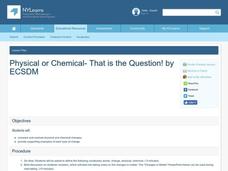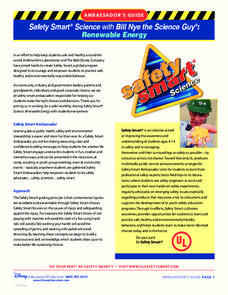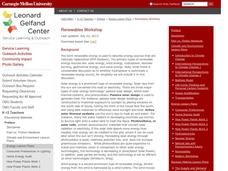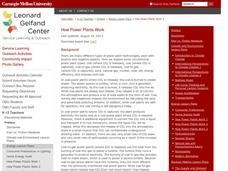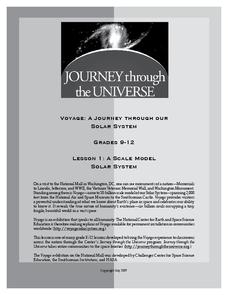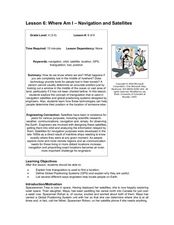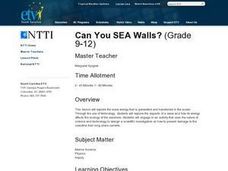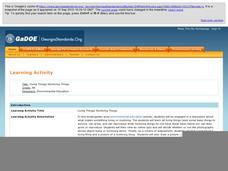Curated OER
Physical or Chemical- That is the Question!
Students observe the differences between physical and chemical changes in properties. Through the use of an interactive presentation, the students compare and contrast the changes and provide supporting examples of each type of change.
Carnegie Mellon University
Consumer Preferences in Lighting
What is a watt? This tongue-twisting, mind-bending question and others are answered through this instructional activity on the different lighting options available. With the support of a PowerPoint, teach your physical science class...
Disney
Renewable Energy
Bring some energy to your physical science curriculum with this engaging Bill Nye the Science Guy lesson. Based on his Renewable Energy video, learners explore the concepts of potential and kinetic energy and learn how they are applied...
NOAA
The Oceanographic Yo-yo
How does chemistry help deep-sea explorers? Part four of a five-part series of lessons from aboard the Okeanos Explorer introduces middle school scientists to technologies used in ocean exploration. Groups work together to analyze data...
Carnegie Mellon University
Renewables Workshop
Youngsters examine resource maps to find out which states are using solar and wind power and discuss as a class various other renewable energy sources. They use a provided data table to record pros and cons to each technology, build and...
Mascil Project
Sports Physiology and Statistics
If I want to build up my heart, where should I start? Science scholars use statistics in a sports physiology setting during an insightful experiment. Groups measure resting and active heart rates and develop a scatter plot that shows the...
Curated OER
Gadget Anatomy
Sure to be a hit with your charges, here is a science instructional activity that has lots of hands-on activities packed into it. The focus is simple machines, and how they help us perform work. After a discussion and demonstration...
NOAA
Wet Maps
How do oceanographers make maps under water? Junior explorers discover the technologies and processes involved in creating bathymetric maps in part three of a five-part series designed for fifth- and sixth-grade pupils. The instructional...
Curated OER
Roller Coasters
Twisting and turning through the sky, roller coasters are popular attractions at amusement parks around the world, but how exactly do they work? Explore the physics behind these thrilling rides with an engineering design activity....
Carnegie Mellon University
How Power Plants Work 3
Double, double toil and trouble, fire burn and cauldron bubble! Find out what drives a turbine to generate electricity and whether or not it has an impact on the environment. A discussion and lecture is divided by a hands-on activity in...
University of Colorado
The Jovian Basketball Hoop
Can you listen to Jupiter on a simple radio? Turns out the answer is yes! The resource instructs scholars to build a simple radio to pick up the radio waves created when the charged particles from the sun hit Jupiter's magnetic...
Wild BC
Is Climate Change Good for Us?
Is it really that big of a deal if the global climate undergoes a little change? Young environmentalists consider this very question as they discuss in small groups the impact of different climate change scenarios on their lives, their...
Journey Through the Universe
A Scale Model Solar System
Between the time scientists discovered Pluto and reclassified it as a dwarf planet, it did not even make one full revolution around the sun. In two activities, scholars investigate scale models and their properties. Pupils find that it...
Curated OER
Where Am I: Navigation and Satellites
Young scholars explore the concept of triangulation that is used in navigation satellites and global positioning systems designed by engineers. They determine ways these technologies can help people determine their position or the...
Curated OER
Can You SEA Walls?
Young scholars explore how wave energy that is generated and transferred in the ocean. They explore the aspects of a wave and how its energy affects the ecology of the seashore. Students engage in an activity that uses the nature of...
Curated OER
Impact of Technology
Students asses the effect of technology on the status and role of individuals, and analyze the postive and negative impact of moderiation on cultural and physical enviroments. Pupils brainstorm examples of postive and negative...
Curated OER
The Power of the Plug: How Electricity Will Change Our Lives... Again
Students study electricity. In this physics activity, students review electrical energy by discussing three ways of generating it. Students explore various energy sources used for creating electricity and examine how different states...
Curated OER
Spear Point Production
Students explore that prehistoric people had to have a good knowledge of the physical world around them in order to choose the best material for spear production. They also explore that prehistoric people were intelligent beings who...
Curated OER
Not So Neutral Views
Young scholars explore ways to use indicators to distinguish between acids and bases. They conduct an experiment to model and discuss the harmful effect of acid rain in our living and non-living environment.
Georgia Department of Education
Living Things/ Nonliving Things
How can you tell if something is living or nonliving? Introduce a set of criteria which can be used to determine which things are alive and which are not. The class discusses the basic needs of all living organisms, checks out an...
Discovery Education
Jets in Flight
This Discovery Education activity provides the information needed to understand the basics of flight. Before taking off, young pilots learn the eight stages of the engineering design process. Small groups then design and build an...
NOAA
A Day in the Life of an Ocean Explorer
What's life like aboard an ocean exploration vessel? Junior oceanographers examine the important role of communication in ocean research in lesson two of a five-part series from NOAA. The materials introduce the class to life on board...
Curated OER
Catalase Enzyme
Students design and conduct an experiment to test their ideas about how to speed up or slow down the rate of an enzyme-catalyzed reaction. They have access to an array of physical and chemical factors that might influence enzyme...
Curated OER
Sink or Float
Second graders explore floating and sinking and make predictions about whether certain objects are likely to sink or float. They read the story Who Sank the Boat? by Pamela Allen. Pupils loacate rhyming words and discuss the events of...


